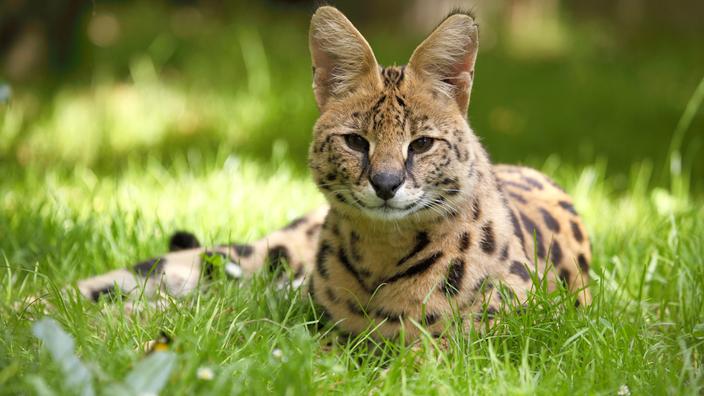Sweet, kind and affectionate, the
Savannah
is a very large cat, very pleasant to live with.
He just needs to have space to work out on a daily basis.
To discover
August: what are the seasonal vegetables and fruits?
This month in the garden: what to plant, sow or harvest in August?
How to keep your pet?
Savannah: its origins
There are several types of Savannah classification classified from F1 to F7.
stock.adobe.com
The result of a cross between a Serval (South African wild feline) and a domestic cat, the
Savannah
is a
large
cat
born in the United States in the 1980s. This breed of cat is part of
the cats group. short haired.
This cat was registered by the TICA (The International Cat Association) in the early 2000s. In France, the Savannah is a rather rare breed of cat.
There are several classifications of the Savannah,
from F1 to F7
:
F1
: 1st generation, one of the parents is serval.
F2
: 2nd generation, one of the grandparents is serval.
F3
: 3rd generation, one of the great-grandparents is serval.
F4
: 4th generation, one of the great rear grandparents, is serval
F5
: 5th generation, a rear rear grand parent, is serval.
F6
and
F7
: 6th and 7th generations, moving further and further away from serval.
The Savannah is also one of the so-called hypoallergenic cats, so it is recommended for people with allergies.
Read also: How to choose the name of your cat?
Savannah: its character
He is a great athlete who loves to play and jump.
stock.adobe.com
The Savannah is an energetic and sociable cat, it is very
attached to its owners
.
He is a large, very talkative cat: he likes to express himself by frequent hoarse meows.
He is a great athlete who loves to play and jump.
This non-shy cat takes pleasure in going in the water.
He is also a great hunter who enjoys running, jumping and climbing.
It is a cat who needs space to let off steam.
In addition, this
breed of cat
appreciates walks with its master (with or without a leash).
With her “glue pot” temperament, the Savannah is very receptive to this experience.
Be aware that there may be a difference in character between generations of Savannah.
F1 and F2 cats (closer to Serval) usually only attach to one person.
On the other hand, the Savannahs of more distant generations (F2, F3, F5) are easier to trust, and therefore bond more easily.
Savannah: his physique
The Savannah is one of the
largest cat breeds
, it has an imposing body.
A serval weighs 13 to 18 kg, but hybridization has resulted in
Savannahs
ranging in weight from 7 to 9 kg and averaging over 45 cm.
To read also: Maine coon: origin, size and character
The hair color of the Savannah is very particular since it resembles that of the cheetah.
Its color ranges from gold to fawn with an almost white belly with black spots.
The hair color of the Savannah is very particular since it reminds that of the cheetah stock.adobe.com
This cat has a slightly rounded head that is quite short compared to its body.
This cat's ears are straight and slightly rounded.
Its eyes are oval and slightly almond-shaped, yellow, green, golden or amber in color.
Finally, the Savannah's tail is rather thick and is shorter than in the majority of its congeners.
Read also: Should you wash your cat?
Savannah: its price
The
price
of a Savannah varies according to the breedings and the pedigree of the line.
Male and female will not cost you the same price.
In general, it takes an average of
1700 €
for a cat registered with LOOF, the official book of feline origins.
The highest bloodlines can be sold for up to
3000 €.
Savannah: his health
The Savannah does not suffer from any
known
genetic disease
.
For this healthy cat, it is recommended to vaccinate it against rabies, typhus, leucosis and coryza, like all its congeners.
Adopting an animal commits you, it's a decision that you will have to think carefully. Do not hesitate to contact your veterinarian or the shelter closest to you before starting. They will be able to give you advice on which cat breed is best for you.

